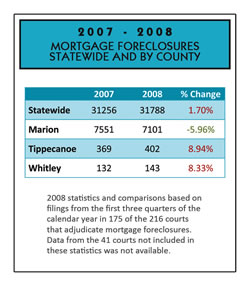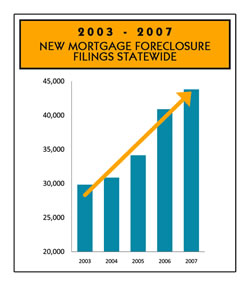 The national mortgage crisis is hitting our state very hard. In 2007 there were 43,804 mortgage foreclosure cases filed in Indiana trial courts, an increase of around 50% in the cases filed just five years ago. The explosion of new cases is causing judges to rethink how they deal with the civil filings that have changed the landscape of the economy and caused personal hardship to so many families.
The national mortgage crisis is hitting our state very hard. In 2007 there were 43,804 mortgage foreclosure cases filed in Indiana trial courts, an increase of around 50% in the cases filed just five years ago. The explosion of new cases is causing judges to rethink how they deal with the civil filings that have changed the landscape of the economy and caused personal hardship to so many families.
“I’ve thought about requiring mediation in mortgage foreclosure cases,” explained Tippecanoe Circuit Court Judge Donald L. Daniel. “People show up and tell me incredibly sad stories about losing a job, having health problems, or being on a fixed income with increased property taxes. They want to find a way to work out the problem in order to keep their home.” Judge Daniel eventually decided against requiring mediation because he was not convinced it would help solve the problem. He and many Indiana judges continue to search for a way to assist citizens who are summoned into court under the devastating threat of losing their homes.
In Whitley County, Superior Court Judge Michael D. Rush sees the same problem and explains, “Homeowners want someone to listen to them. They need to explain why and how this happened. They even offer an apology in some cases.” Judge Rush too is at a loss for how to handle the growth of foreclosure cases. “I’ve been on the bench fifteen years and I would say I have seen more foreclosures in the past two years as I did the previous thirteen.” These cases are extremely upsetting for the homeowners but they are also emotionally distressing for the judge and his staff. “I live in a smaller county of 35,000 people. We often know these people, we know their friends and family, and we can put a face with a name. But, if they can’t pay their promissory note, I can’t make an exception. The law is the law.”
 From the smallest to largest counties in this state, this crisis has judges scrambling for a new approach that may serve as a solution to the national problem. In Marion County, the Superior Court Civil judges have agreed to set up settlement conferences between lenders and homeowners. Marion Superior Court Judge Cynthia Ayers is working on the process. According to Judge Ayers, the courts will serve as facilitators but judges will not directly take part in the conferences. It is a small way to help a person who is being sued for foreclosure and facing the prospect of losing his home. If the homeowner indicates a desire to work out a solution, the court will send him a Notice of Settlement Conference and a financial declaration form. The court will coordinate a time for the homeowner and the lender to speak or meet and attempt to find a way to avoid foreclosure.
From the smallest to largest counties in this state, this crisis has judges scrambling for a new approach that may serve as a solution to the national problem. In Marion County, the Superior Court Civil judges have agreed to set up settlement conferences between lenders and homeowners. Marion Superior Court Judge Cynthia Ayers is working on the process. According to Judge Ayers, the courts will serve as facilitators but judges will not directly take part in the conferences. It is a small way to help a person who is being sued for foreclosure and facing the prospect of losing his home. If the homeowner indicates a desire to work out a solution, the court will send him a Notice of Settlement Conference and a financial declaration form. The court will coordinate a time for the homeowner and the lender to speak or meet and attempt to find a way to avoid foreclosure.
Judge Ayers is also trying to develop a more complete solution by serving as the chairperson of the Indianapolis Bar Association Mortgage Foreclosure Task Force. The group includes attorneys who work for state agencies or have experience with consumer issues. Judge Ayers has also recruited volunteers, “I was fortunate to be able to assemble a group of attorneys from both sides of the problem who have been working very hard over the past 3 or 4 months to put together an assistance program.” This task force has partnered with the Indiana Foreclosure Prevention Network and Judge Ayers is hopeful that together they will be able to make a difference.
The task force is also addressing one of the main concerns of judges from across the state, pro se litigants. It is rare for a person coming into court for a foreclose case to be represented by an attorney. Judge Rush has observed, “If they can’t afford to make their mortgage payments, how can they afford to pay an attorney to defend them in a foreclosure case?”
 One goal for the Mortgage Foreclosure Task Force is to provide pro bono legal services to homeowners who might be able to work out a solution with their lender. Judge Ayers says the plan is for the Indianapolis Bar Association to develop a list of pro bono attorneys who will work on behalf of the homeowner in dealing with the lenders. The group is also looking for attorneys who will answer an 800 number helpline that will provide on-call legal assistance. Eventually, the task force hopes the Bar Association serves as a central resource with information on what assistance may be available at the local, state and federal levels.
One goal for the Mortgage Foreclosure Task Force is to provide pro bono legal services to homeowners who might be able to work out a solution with their lender. Judge Ayers says the plan is for the Indianapolis Bar Association to develop a list of pro bono attorneys who will work on behalf of the homeowner in dealing with the lenders. The group is also looking for attorneys who will answer an 800 number helpline that will provide on-call legal assistance. Eventually, the task force hopes the Bar Association serves as a central resource with information on what assistance may be available at the local, state and federal levels.
Judges in the meantime are referring families to community groups that might be able to offer additional support. Judge Daniel explained, “I try to do what I can to help homeowners understand the process and refer them to emergency housing or family service agencies.” He admits he has been shocked to recognize some of the names on the foreclosure list. He and many other judges from across the state hope to offer a local solution to families struggling with this national crisis that has literally landed in our backyard.
